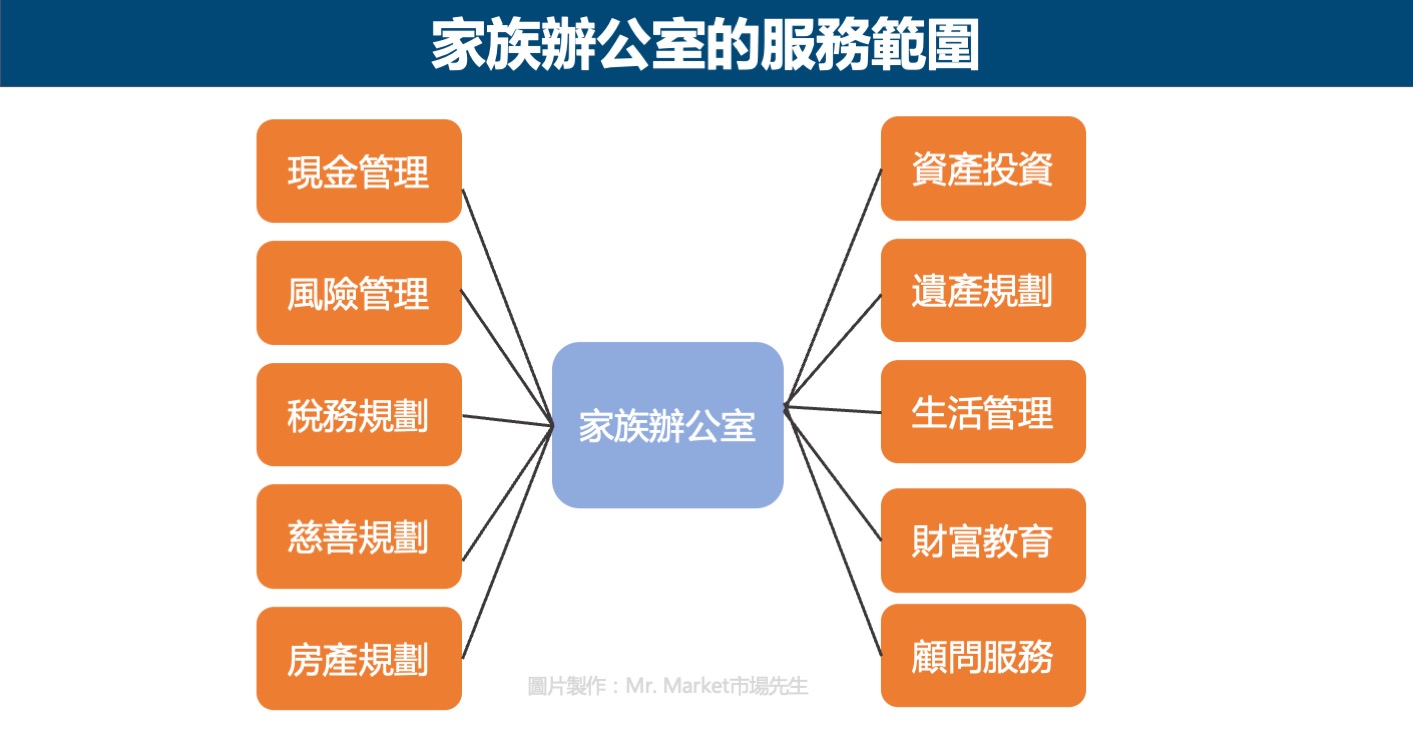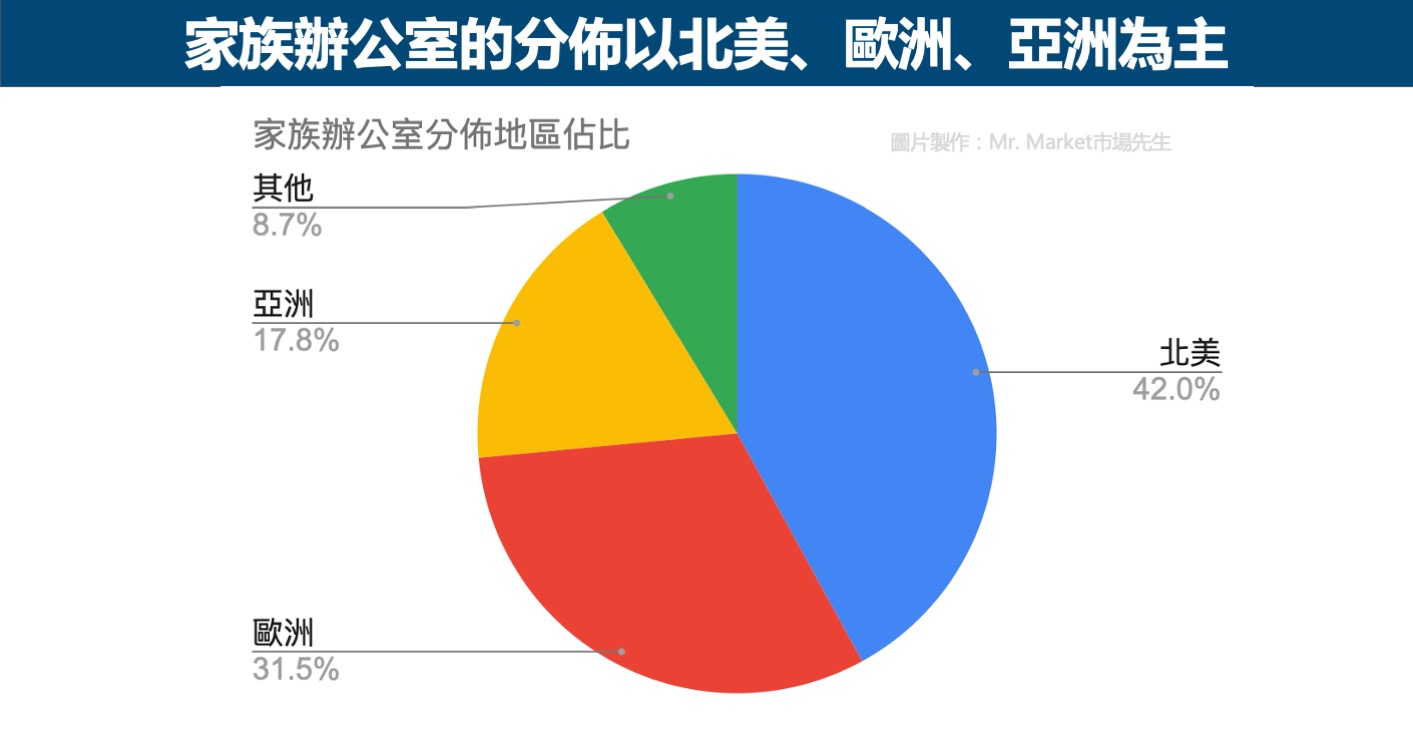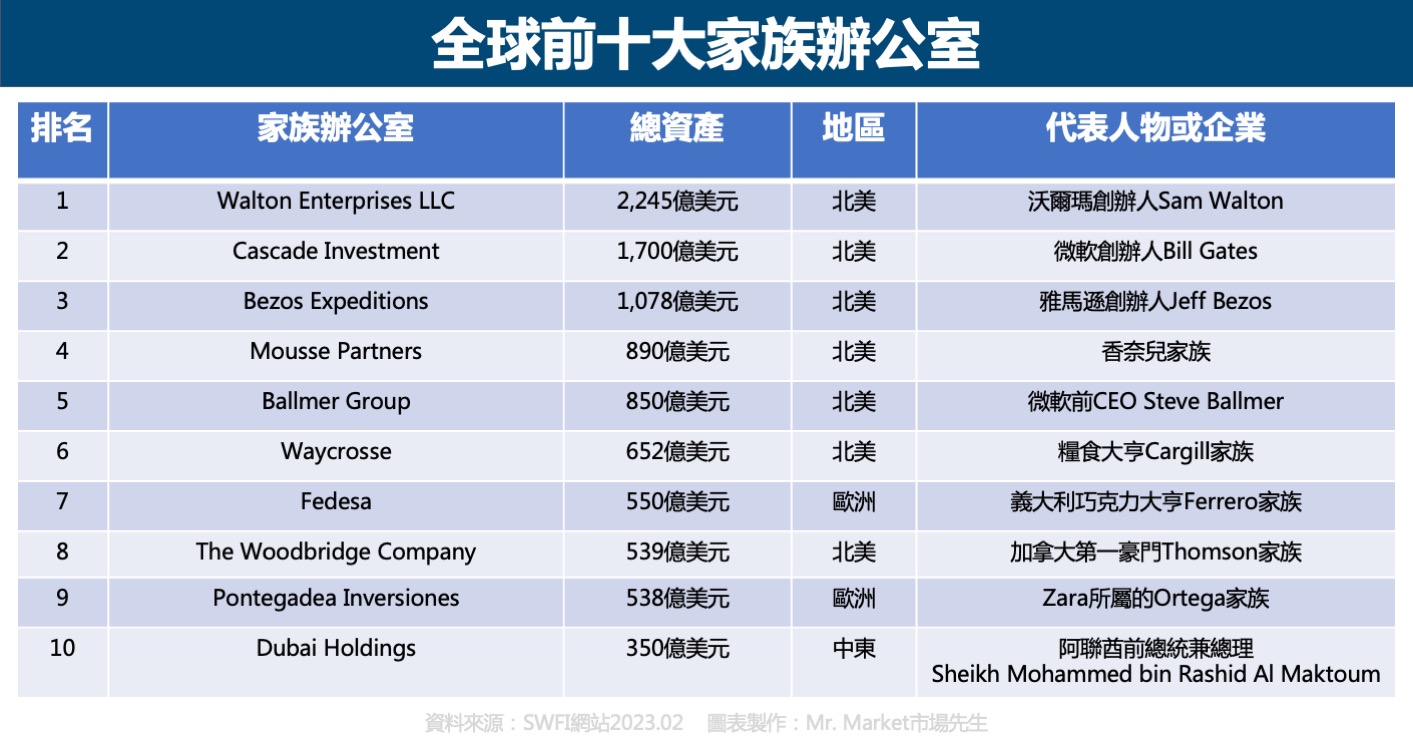What is a family office? Introducing the world's top ten family offices
#Corporate News ·2024-01-09 00:00:00
In some private equity funds, we will see that the main investors are family offices. Many entrepreneurs and families of ultra-high-net-worth people may have their own family offices to provide asset management services, and Mr. Market himself has some friends who are quite professional in investment, and they also have experience working in some family offices, which is also a relatively unique field in the financial field. What exactly is a family office? What is the current development status of family offices in the world? The following Mr. Market will give a brief introduction.
What is a family office?
Family offices are private wealth management consulting firms that specialize in providing services to the families of ultra-high-net-worth clients, usually high-net-worth clients with total assets of more than $100 million, managing assets of more than $10 million, to meet the threshold and be cost-effective.
The difference between family offices and ordinary banks in wealth management is that the scope of family office services is not only investment, but also more comprehensive covering finance, law, accounting, taxation, charity and other comprehensive services.
Family offices can be established by individuals and families on their own, or entrusted by professional institutions, in different countries there will be different regulations and tax and thresholds for family offices and assets under management, some countries even have tax exemption benefits, at present,
in recent years, most of the people who have family office needs are high-net-worth people who want to get more tax incentives in asset management.
Scope of services for family offices
Family offices can be divided into two main types:
1. The family hires someone to manage the assets themselves
This usually has a narrower scope, mostly focusing on investment management, mainly hiring investment professional managers, sometimes including accountants and lawyers.
Unless it is a large family with a very large scale and history, the staff size is generally not too large, serving the family business, and the extent to which other additional things are done depends on how much work they want to do and how much money they spend.
This type of family office is similar to starting a company, where the employee pays a salary bonus, unlike ordinary trusts or funds, and does not charge management fees based on the size of the funds under management.
If the family has other professional service needs, such as legal and charitable services, some services can also be outsourced.
2. Entrust a professional organization to handle it on your behalf
Some professional institutions will specialize in providing outsourcing hosting services for family offices.
The scope of services in this way will be quite diverse, as shown in the figure below, and the fees will also be based on management fees.

To serve these super-wealthy, family offices need professionals from all walks of life, including lawyers, insurance planners, accountants, estate planners, business professionals, fund managers, etc.
The services provided by family offices include cash management, risk management, tax planning, charity planning, property planning, asset investment, estate planning, etc. Some even include life management (e.g. aircraft and yacht management, travel planning, concierge management), family wealth education (educating the next generation about the right wealth and values), and a variety of consulting services.
If it is a family office managed by an external professional organization, the charging methods can generally be divided into the following three types:
- Collect product commissions: Earn product commissions on products invested by customers
- Charge management fee + investment income share: Charge a basic management fee plus investment income share
- Charge a fixed annual fee: That is, a fixed consulting fee or consulting fee is charged
In Western markets, charging a fixed annual fee is the more mainstream method because it avoids conflicts of interest and puts the interests of customers first.
What are family offices investing in?
Family offices can provide customized investment management solutions for customers according to the needs of the family itself, including general standardized investment products.
Such as stocks, bonds, ETFs, funds, etc., it will also include private equity, luxury goods, cryptocurrencies, real estate, etc.
Generally speaking, when setting up a family office, professionals will also be hired (the size of the self-built management team is generally not large, usually 1~5 people manage the investment portfolio, and others have a small number of administrative, accounting, tax, legal and other personnel), or outsource to operate assets on their behalf.
According to the "2019 Global Family Office Report" conducted by Swiss Bank and Campden Research, private equity (which can be understood as unlisted companies) accounts for about 20% of global family office portfolios, with an average return of 8.6%~16%.
Advantages of a family office
Family offices offer the following benefits for high-net-worth families.
Advantage 1: Financial and tax advantages
Family offices pool the family's assets together because the funds are large enough, and the investment targets are wider than ordinary people, and the operating costs can be lower and more efficient.
In addition, tax advantages are also a major consideration, some family offices will be set up in some tax-advantaged regions (such as Singapore), so that the investment capital gains, dividends, and interest of family assets can obtain tax-free or low tax rates, which will be more advantageous and flexible than investing in the name of an individual or a company.
Advantage 2: Increase transparency and trust within the family
The family office is the aggregation center of information and reports to family members regularly, enhancing overall transparency and trust within the family.
Advantage 3: Assist the family in generational handover
Families who want to continue their family business for generations will need someone to help them plan ahead, and the family office can be responsible for the next generation to ensure that family members are ready to enter an important organization like the board of directors.
Advantage 4: Privacy protection
Family offices can keep sensitive family information within the family office instead of cooperating with multiple financial institutions and outsourcing agencies, increasing the risk of information leakage, which can protect the family from various threats such as extortion or fraud.
Disadvantages and risks of family offices
Family offices carry the following risks.
Risk 1: Lack of transparency and regulation
Currently, the level of regulations related to family offices varies from country to country, and some countries do not even have clear regulations, which also exposes family offices to the risk of lack of transparency and regulation.
A well-known case is Archegos Capital, which has more than $100 billion in assets under management by 2020, and is actually a highly leveraged hedge fund that invests in the name of a home office.
In 2021, it announced its bankruptcy, causing the bank to lose a huge amount of money. Credit Suisse lost $50 billion, Nomura lost $29 billion, and Morgan Stanley also lost $10 billion.
Risk 2: Agent risk
A family office is equivalent to handing over the family's assets to professional managers to manage, but whether these managers can make the most beneficial investments from the family's standpoint is still a question.
Some managers may receive bank commissions for their own benefit, or make investments that are unfavorable to the family, which is one of the risks of family offices.
The current state of family office development
At the end of the 19th century, the Rockefeller family, an American oil tycoon, first created a family office, and since then, until the 80s of the 20th century, family offices have become more and more popular.
According to Mordor Intelligence, as of Q2 2019, the number of family offices worldwide reached 7,300, an increase of 38% over the same period in 2018.
In terms of regional distribution, North America is the largest distribution of family offices, accounting for 42%, followed by Europe at 31.5% and Asia at 17.8%.
In Asia, Singapore has attracted many wealthy people around the world to set up family offices here due to its tax benefits, including Sergey Brin, founder of Google Foundation, Ray Dalio, founder of Bridgewater Fund, and Yong Zhang, founder of Haidilao.
As of October 2020, there are about 200 family offices in Singapore, with a total of about $200 billion in assets under management.

Top 10 family offices in the world
According to the latest statistics from the SWFI website in 2023/02, the top 10 family offices in the world are currently ranked by asset size as follows.
The first place is the Walton family of Walmart, with total assets of $2245 billion.

What kind of people need a family office?
Family offices are very expensive to set up and operate, so most people don't need these services.
People who usually need a family office, in addition to having quite high assets (more than $100 million), usually have complex financial and investment needs, or have other personal needs, such as cross-generational inheritance, philanthropy, concierge services, etc.
When you need to hire a team composed of accounting, legal, investment, and other professionals to manage assets, you are actually a family office to some extent.
At present, family offices in the market provide more complete services.
Quick summary: What is a family office?
- A family office is a private wealth management consulting firm that specializes in serving the families of ultra-high-net-worth clients, usually high-net-worth clients with total assets of US$100 million or more*.
- What sets family offices apart from ordinary banks in their wealth management is that their services are not only investment, but also more comprehensive services such as finance, law, accounting, and taxation.
- In addition to common stocks, bonds, ETFs, and funds, family office investments also include private equity, luxury goods, cryptocurrencies, real estate, etc.
- As of Q2 2019, the number of family offices worldwide reached 7,300, with North America being the largest, followed by Europe and Asia.
*It's not that you have to spend $100 million to set up a family office, but you don't actually need that much, for example, the assets you just took out as management may be $10 or 20 million. The main reason is that people with assets of 100 million US dollars are more likely to have family office needs and bear the starting costs.
Mr. Market's experience:
I first learned about family office because some friends around me jumped from the financial industry to work in a family office, so I realized this asset management service that most people have rarely heard of.
In fact, it can be simply thought of as a secretarial and logistics service company specializing in serving high-net-worth individuals, serving from a family to an entire family, with core business mainly focusing on asset management and inheritance, covering professional fields such as investment, taxation, and law.
Family offices can be large or small, from less than ten people to dozens of people, depending on the content of services provided and the size of assets under management.
In the past, I heard that there was a need for family offices, mainly because the owners of some listed companies would have their own family offices, not necessarily serving large families, and individuals with sufficient financial strength could actually do it,
mainly because they needed to manage their assets more efficiently and obtain tax incentives for investment.
If ordinary people have intermediate assets and need such services, but the assets are not enough to meet the threshold of a family office,
then the investment part is through funds or bank wealth management services, and the accounting, tax and legal needs are handled by relevant firms.
Although these external services are not specifically for families like family offices, and the cost is not necessarily low, they can also get professional services, and you can judge and seek help according to your own needs.
Tags:
-

The financial sector advocates optimizing taxation such as family offices to help attract foreign investment
2024-02-21
-

Targeting Asia's Rich Hong Kong New Deal Attracts Family Offices to Compete with the Stars
2024-02-16
-

CPA Australia urges the Government to take measures to enhance Hong Kong's competitiveness in the Budget
2024-02-16





